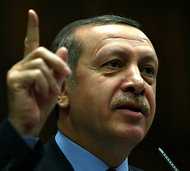By ANDREW FINKEL

ISTANBUL — Is Turkey’s prime minister past his expiration date? At first glance, the question sounds absurd. Recep Tayyip Erdogan has led his Justice and Development Party, known as the A.K.P., to three consecutive electoral victories, most recently in June 2011, and few doubt that if there were an election tomorrow he would chalk up victory number four.
A decade of A.K.P. rule has transformed Turkey from a debt-ridden, inflationary economy to one of the fastest-growing in Europe. The increase in confidence and prosperity has allowed Erdogan to tame the country’s military and reel in its die-hard judiciary. But there are ominous signs that the prime minister intends to overplay his hand.
This week, Erdogan said that Turks should begin debating a move from the current parliamentary system, in which most of the governing power rests with the prime minister, toward a presidential system with a more powerful executive, along the lines of the United States or France. Everyone knows what his push for a stronger president means: Erdogan would jump ship before his term as prime minister ends in 2015 and stand as president himself when the job becomes vacant in 2014. He would continue leading the country, with more power than ever.
The vehicle for change would be a major revision of the out-of-date Constitution. Most Turks agree that the country needs a new charter — one that would finally enshrine individual rights and provide for greater accountability and government transparency. In the view of many, the current Constitution concentrates too much power in the hands of an unelected state apparatus. Enacted in 1982 when the country was under military rule, the Constitution is seen as full of fussy provisos designed to protect the government from its citizenry rather than the other way around.
Notoriously, the Constitution tries to resolve Turkish Kurds’ demands to be able to express their own identity by pretending that those demands do not exist. Even agitating for regional devolution of power can be interpreted as an assault on the integrity of the state. And the biggest problem is that the Constitution’s guarantees of basic rights and freedoms are subject to so many qualifications that they end up being no guarantee at all.
The government is right to want to replace it. But the new Constitution has to be better than the old one. It should not serve as a means for Erdogan to hold on to power.
Under the current system, the president is not powerless: he appoints senior bureaucrats and can veto laws passed by Parliament, but the main power flows from the prime minister. As head of the cabinet, the prime minister has responsibility for the day-to-day running of government.
While no one has yet spelled out what a strong presidency would look like, it can be assumed that it will combine the might of the current office with that of prime minister. To do so without the approval of a popular referendum would mean securing the support of two-thirds of the Parliament and winning the support of at least one other party.
It is already clear that no opposition group would be willing to support a constitutional change that would end up giving Erdogan so much power. But that hasn’t stopped the prime minister from trying. His political allies have also joined the fray. Deputy Prime Minister Bekir Bozdag said this week that a presidential system allows for “the most effective supervision.’’
As a result of Erdogan’s efforts, discussion over the shape of the future of Turkey under a new Constitution will be hijacked by a debate over the future of just one man. Unfortunately, all of this is a distraction from the real issue of how to make Turkey’s government more representative.
At the moment Erdogan resembles a Moses wandering in the desert: having led his people from one sort of bondage, he is unable to lead them to the promised land. If he believes so strongly that Turkey should have a presidential system, then he first needs to declare that he is not a candidate.
Andrew Finkel has been a foreign correspondent in Istanbul for over 20 years, as well as a columnist for Turkish-language newspapers. He is the author of the book “Turkey: What Everyone Needs to Know.”
via Erdogan Moves to Extend his Hold on Power in Turkey – NYTimes.com.

Leave a Reply